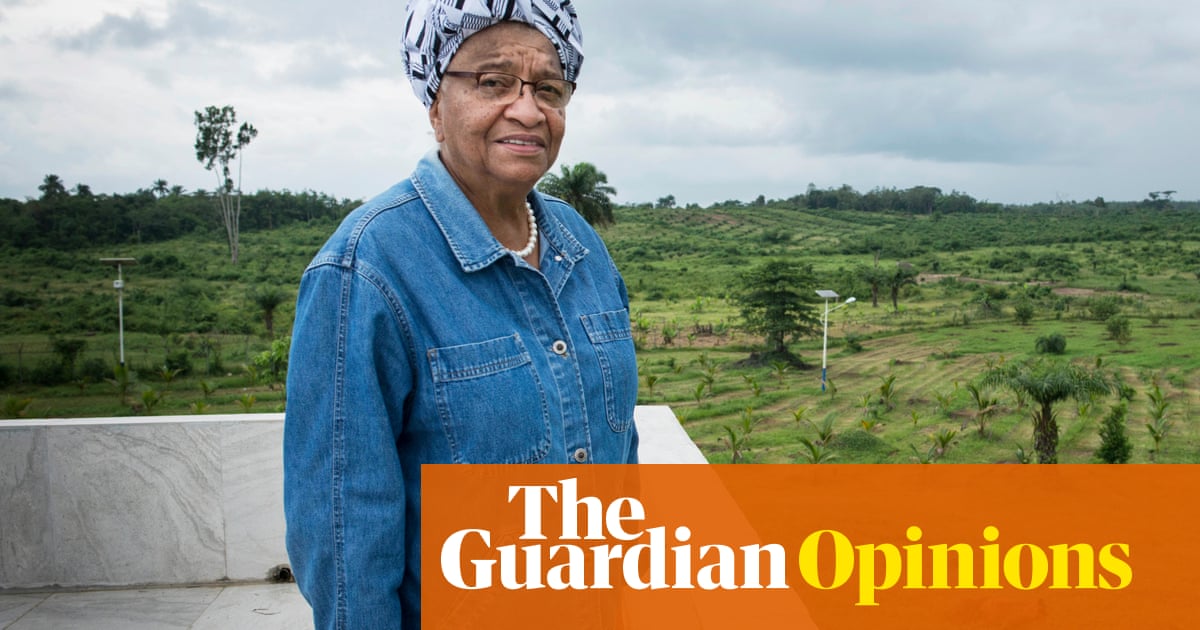It is sad when a ruthless military dictator funds his government by destroying ecologically important rainforest, logging tropical trees and displacing and robbing the people who live in and depend on the forests for their livelihoods and culture.
This happened in my country,Liberia.
When, in 2005, I becamethe country’s first president to be electedafter adevastating civil warthat deposed that dictator, I was charged with helping Liberia recover.
Liberia has more than half of west Africa’s remaining forests, which cover almost half of the country, approximately 6.6m hectares (16m acres) based on the2019 National Forest Inventory. But our special trees have long been threatened because the timber fetches premium prices.
At the end of the war, we found that about60% of our country had been allocated in 28 logging “concessions” – agreements with companies providing exclusive rights to log the forests.
My government cancelled all of these concessions and implemented a moratorium to better understand what we were harvesting and where it came from. We lifted the moratorium after we introduced a transparent process to allocate new logging and other land-use concessions.
In 2006, we secured passage of theNational Forestry Reform Law, which recognised the problems of the past and stressed the integration of community, conservation and commercial forest management for the benefit of all Liberians. The reform process was supported by the UN, the World Bank and the European Union, aiming to improve Liberia’s forest governance, promote sustainable management, enhance transparency in the sector and secure the future of its vast forest resources.
Today, the Forestry Development Authority (FDA) runs systems that track timber harvesting, locating the geographic source and species of every piece of wood exported from Liberia. With this transparency, the timber market can steer clear of anything harvested illegally – from protected areas, endangered trees or community lands without consent.
Timber exports accounted for7.5% of Liberia’s GDP in 2020, much of it shipped to Chinese markets. EU log imports from Liberia were $2m in 2020, one-seventh of that sold to China. It is important to diversify our reliance on this one market to help generate a more sustainable future for the sector, and greater access to European markets is essential to achieving this ambition.
The system Liberia uses to track timber production was developed after we signed the Voluntary Partnership Agreement (VPA) with the EU. The VPA was an important signal that Liberia was serious about gaining control over logging, and that the EU recognised these positive developments. Commendably, transparency in sourcing is required of all timber produced under a VPA, including for export to EU markets.
This agreement was one of the first critical steps implemented by my government. Forest sector oversight and increasing the credibility of timber exports, including for European markets, has been crucial in Liberia’s recovery.
But the mood today is to retreat from international commitments and cooperation. The EU has moved to cancel this agreement, threatening a key segment of our economy. And without recognition in markets that give importance to compliance with our regulations, we are worried that the illegal timber trade will once again take root in our country.
We risk the disintegration of the system that has supported forest sector oversight, one that established a unique benefit-sharing mechanism for local people, resulting in $4.3m going to communities already, with additional revenues to come that are tracked through Liberia’s systems, set up through the VPA.
Considering the context of Liberia, with its history of conflict, restoring the forestry sector is a slow process with many ups and downs. Cancelling the VPA would undermine our achievements over the years and seriously put at risk any governance reforms.
This is not theoretical. The Grebo-Krahn national forest, on Liberia’s border with Ivory Coast, might not have survived to this day without more sustainable and economically feasible alternatives.
Grebo-Krahn is home to pygmy hippos, acritically endangered speciesthat became popular recently on social media when two zoos posted images of pygmy hippo calves. There are only 2,000 of them left in the wild, most of them in Liberia.
We worry what will become of this species, along with other endangered wildlife.
There is huge concern for the communities that live in and depend on the forest and all other threatened regions if illegal timber becomes the norm once more.
We live in an interconnected global community where mutual support is essential. While the EU-Liberia VPA may not hold significant weight in every part of the world, it has been crucial to our social and economic security. This is an agreement that must not be cancelled.
Ellen Johnson Sirleaf, the 24th president of Liberia, was the first elected female head of state inAfrica. She won the Nobel peace prize in 2011
